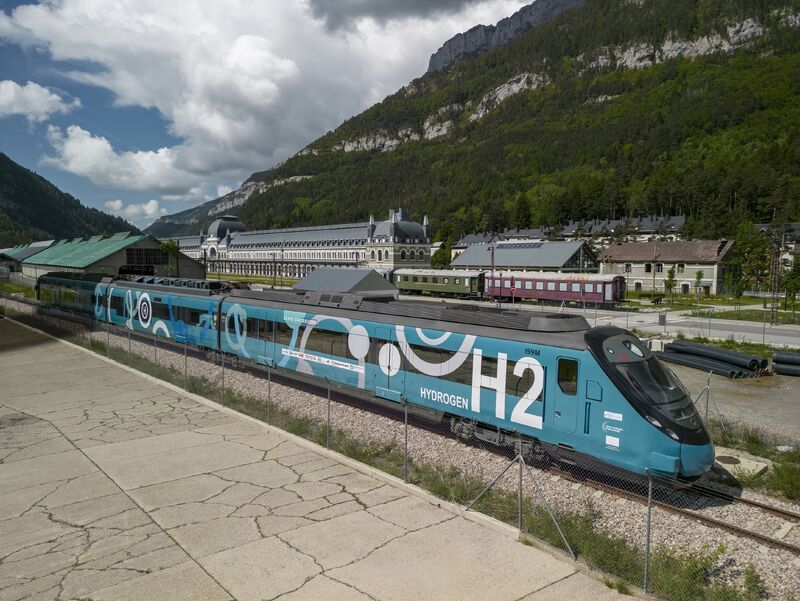 An electric-hydrogen train entered tests in Spain developed by a consortium made up of CAF, DLR, Toyota, Renfe, Adif, CNH2, IP and Stemmann-Technik under the FCH2Rail project.
An electric-hydrogen train entered tests in Spain developed by a consortium made up of CAF, DLR, Toyota, Renfe, Adif, CNH2, IP and Stemmann-Technik under the FCH2Rail project.
Following authorisation, the testing phase has started with the first test run on the Zaragoza – Canfranc line, in the Aragonese Pyrenees and it will continue on lines in Madrid and Galicia. This is an outstanding highlight, because the Canfranc line is a particularly demanding line due to its steep and high gradients, which involve a great challenge for the new power generation systems. To this end, the demonstrator train, a Renfe’s Civia commuter unit, has run on the Zaragoza – Canfranc line both in electric mode, in the electrified area, and in hybrid mode, combining energy from hydrogen fuel cells and batteries in the non-electrified sections.
A new stage of on-track testing is now underway with the aim of testing the new technology in a wide range of power and energy demand conditions, simulating different commercial services. To this end, the bi-mode train is scheduled to run on different lines of the Spanish railway network, mainly on lines in Aragon, Madrid and Galicia. The test scenarios include running under different climatic and operating conditions. This will allow a more complete characterisation of the new on-board technology, for the subsequent evaluation of the competitiveness of the new bi-mode hybrid propulsion solution with hydrogen fuel cells as a sustainable alternative to the diesel traction currently used on many lines.
The electric-hydrogen train is based on one existing Renfe commuter trainset, in which CAF has installed a new power generation system that uses the hybridisation of energy from hydrogen fuel cells and batteries. This new power system has been integrated into the vehicle’s existing traction system. After the static testing phase at the CAF’s plant in Zaragoza and the first hydrogen refuelling, the dynamic tests began in mid-2022 on a closed track, which have served to optimise the new power system prior to the current testing phase on representative lines of the Spanish railway network.
The start of this new testing phase has meant the first authorisation from Adif for the circulation in tests of a hydrogen train on the country’s rail infrastructure, passing all the risk analysis and safety validation processes inherent to the testing of new technologies. At the same time, the train drivers and train managers from Renfe have received the necessary training to drive the Civia train converted to a bi-mode hydrogen train.
The success in the development of this project confirms and reinforces the commitment of the companies that make up the FCH2Rail consortium to the development of environmentally friendly mobility solutions.
The project began in 2021 and is scheduled for completion by the end of 2024. The project has a EUR 14 million budget, EUR 10 million of which is being funded by the Clean Hydrogen Partnership, formerly FCH2 JU, the European Commission agency dedicated to promoting the development of hydrogen and fuel cells.
Share on:



